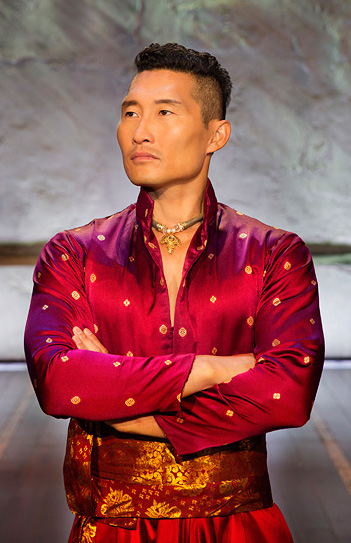 After two hit TV shows Daniel Dae Kim is Broadway's new King of SiamTwo Must Reads today that are a pleasure to highlight
After two hit TV shows Daniel Dae Kim is Broadway's new King of SiamTwo Must Reads today that are a pleasure to highlight
The Hollywood Reporter published a piece called "Where are the Asian-American Movie Stars?" that's definitely worth a look. Kudos to fine actors like Maggie Q, Daniel Wu, Daniel Dae Kim, Ming-Na Wen and others for forging and holding down careers (it can't have been easy) and speaking out about the white-washing. The problem is not just that Hollywood doesn't get it but that they also don't make use of what they already have. There is plentiful camera-ready talent out there, but Hollywood mostly ignores Asian Actors.
The white washing is so egregious lately that even an upcoming animated film from China called The Guardian Brothers has an all non-Asian voice cast for its US release! What the holy f***? That cast includes Meryl Streep and Nicole Kidman, and quite frankly that pisses me off. They should know better. Neither of those perpetually working Oscar winning goddesses need the exposure, the work, or the money that that job will offer.
[More after the jump on this topic and Method Acting, too...]
 A still from The Guardian Brothers (which was released in China as "Little Door Gods")
A still from The Guardian Brothers (which was released in China as "Little Door Gods")
And publicly refusing to take roles that should go to Asian actors would be a really low stakes way for movie stars to win high praise and contribute to bettering Hollywood; they lose nothing, Asian actors gain something. It's a win-win for everyone.
Why do major stars keep thinking this is okay? Their careers are fine without these roles. (One caveat: I don't much mind the Tilda Swinton casting in Doctor Strange because they've obviously rethought the character entirely and I can see artistic reasons for going off the wall / off gender / off race / off Earth -- we all know Tilda is an alien creature -- and such with that extra-dimensional project but the other recent examples have just been easily avoidable and embarrassing for all involved.)
One excerpt from the THR piece.
One prominent Hollywood agent told THR that the holy grail is in developing Asian-American actors who can become stars on both sides of the Pacific. But a few already exist: Q and Daniel Wu, now starring on AMC's Into the Badlands, are Americans who built successful careers in Hong Kong before crossing (back) over to the States. "Starting in Asia was interesting because my career was so confusing for Hollywood. Before I got Mission: Impossible III, I met with the big agencies at the time, and I don't think they were as aware of the global market. There was almost zero interest in me as an entity," Q says. "My agency now [CAA] was the only one that said, 'This is unique. Half the world knows you already.' That for Daniel and I both was a huge plus because we could bridge the Asian gap and they could bank on us to do movies here and be able to sell them in foreign territories. That was something very unique that has only happened to a few people that I know of."
Finally, please do click over to the Telegraph to read an amazing piece by Robbie Collins called "Why Hollywood Went Method Acting Crazy" that looks at Method Acting from a really unique angle that made me rethink acting history altogether. It starts with Jared Leto's Joker but, never fear, that's just there as the hook to rope in unsuspecting readers via click-bait.

After surveying recent examples of Oscar winners, Collins writes:
There’s always a lot of talk about actors ‘disappearing into roles’, but in situations like these, that’s not what’s actually happening at all. Instead, what ends up on screen is a kind of actor-character hybrid, and the hard labour of bringing the role to life becomes part of the reason – sometimes even the main one, in fact – we want to watch.
One problem with the new craze for method acting is that it has almost nothing to do with real method acting in the slightest, which was adapted from the teachings of the Russian theatre director Konstantin Stanislavski by the American acting coach Lee Strasberg in the 1930s.
It's fascinating so go read it!